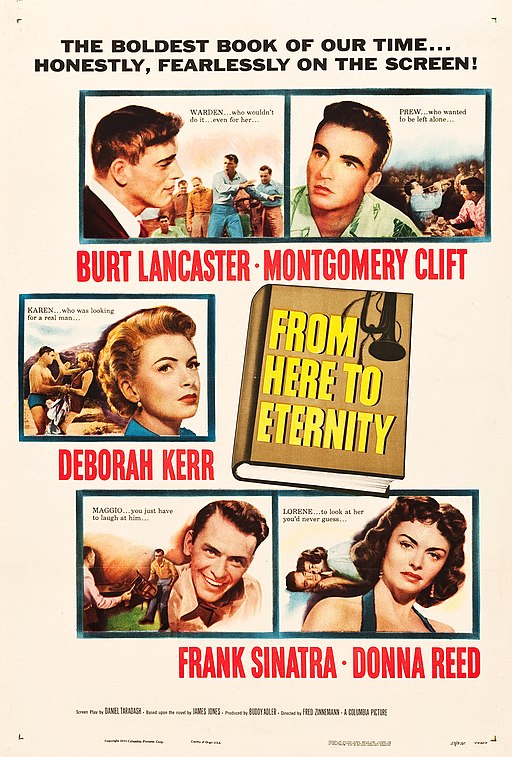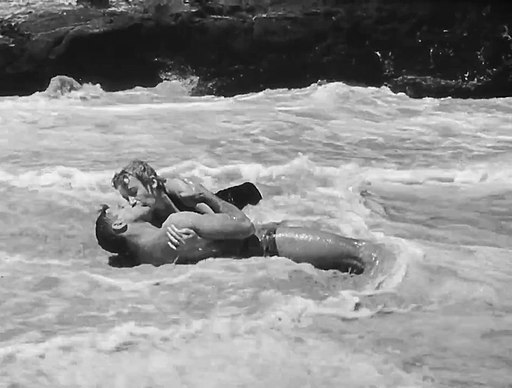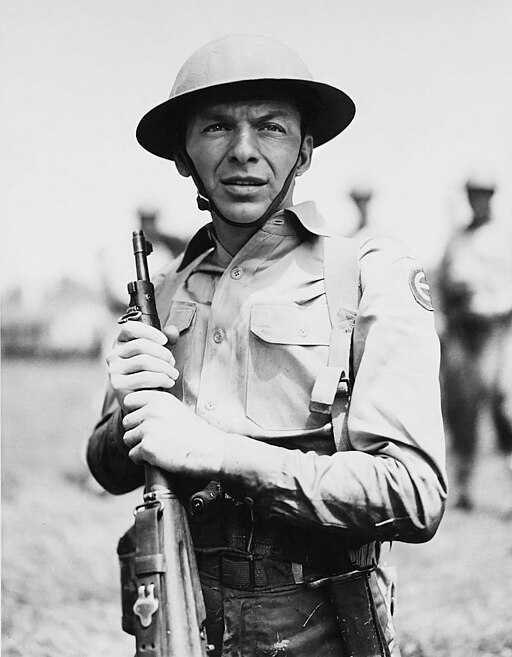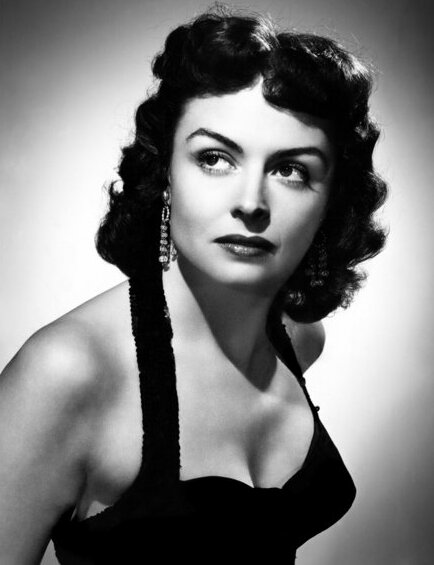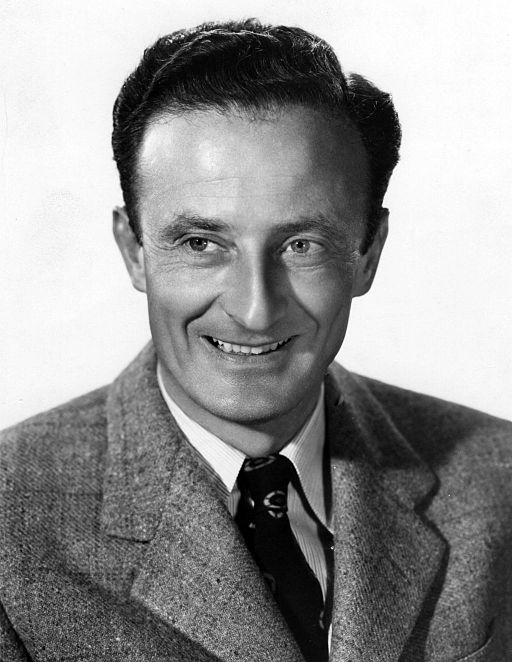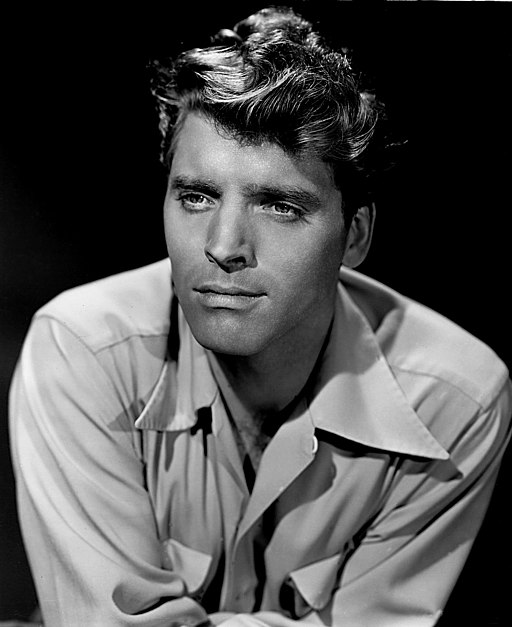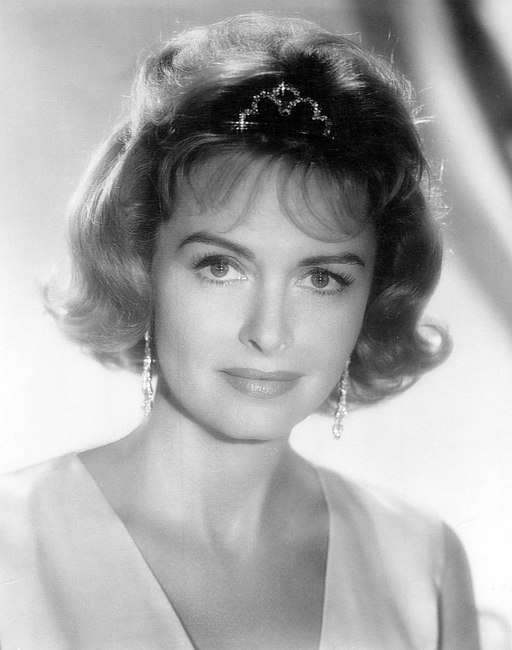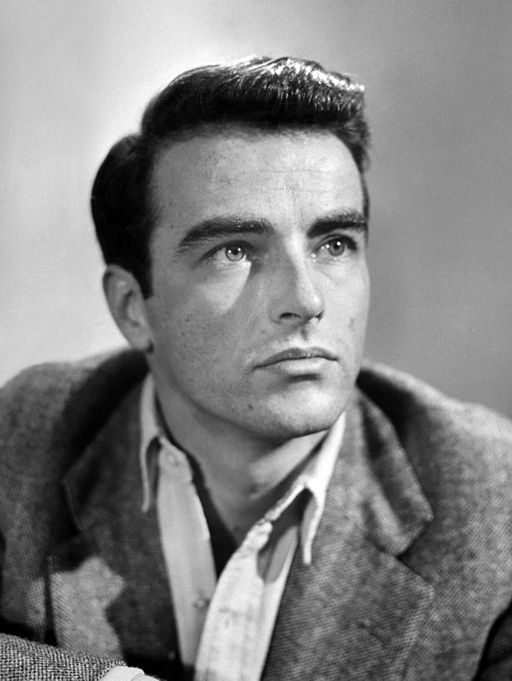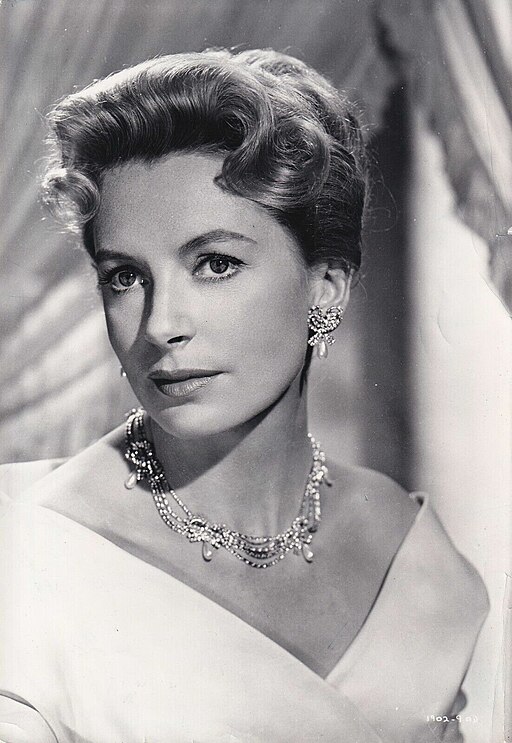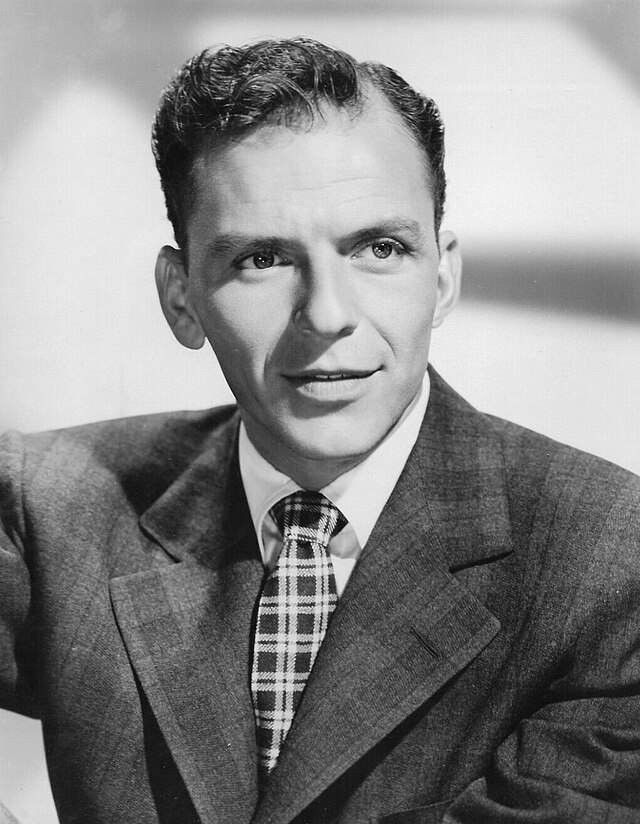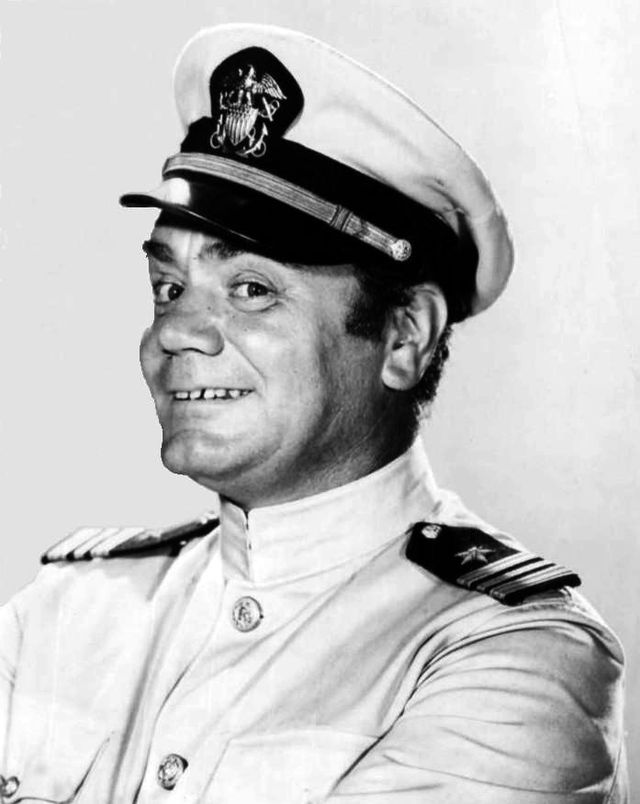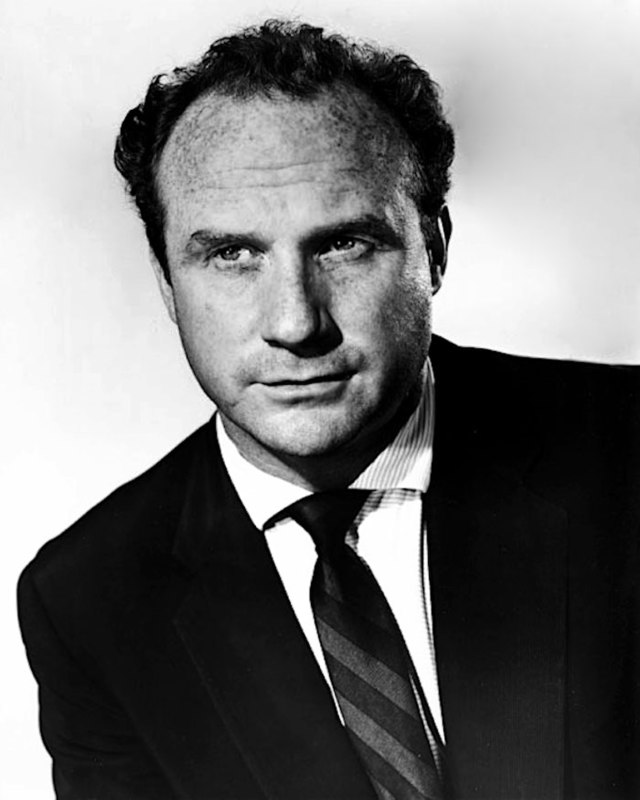From Here to Eternity - 1953
back| Released by | Columbia Pictures |
| Director | Fred Zinnemann |
| Producer | Buddy Adler |
| Script | Daniel Taradash, based on the novel by James Jones |
| Cinematography | Burnett Guffey |
| Music by | Morris Stoloff and George Duning |
| Running time | 118 minutes |
| Film budget | $1.65 million |
| Box office sales | $30.5 million |
| Main cast | Burt Lancaster - Montgomery Clift - Deborah Kerr - Donna Reed - Frank Sinatra |
From Here to Eternity – 1953’s movie hit
"From Here to Eternity" is a gripping drama set in 1941, on the cusp of America's entry into World War II. Directed by Fred Zinnemann, the film unfolds at an Army base in Hawaii, exploring themes of love, power, and the moral dilemmas of war.
Private Robert E. Lee Prewitt (Montgomery Clift), an ex-boxer, transfers to the base, only to face harsh treatment for refusing to join the boxing team. His friend, Angelo Maggio (Frank Sinatra), grapples with his own battles, particularly against the brutal stockade sergeant, James R. Judson (Ernest Borgnine).
Meanwhile, First Sergeant Milton Warden (Burt Lancaster) engages in a clandestine affair with the base commander’s wife, Karen Holmes (Deborah Kerr), both seeking solace from their troubled lives.
The story builds to a poignant climax, marked by tragedy, personal redemption, and the haunting reality of war. The film's iconic beach scene, stunning performances, and exploration of authority and personal integrity contribute to its lasting legacy in cinema. "From Here to Eternity" remains a powerful examination of the complexities of duty, love, and the human spirit.
Related
From Here to Eternity – Analysis and impact
Summary:
"From Here to Eternity" is a sweeping drama set in the days leading up to the attack on Pearl Harbor, focusing on the lives of U.S. Army personnel stationed in Hawaii. It explores themes of love, loss, and the harsh realities of military life. The film is renowned for its strong performances, especially from Frank Sinatra and Donna Reed, both of whom won Academy Awards for their roles. Burt Lancaster and Montgomery Clift also delivered iconic performances, contributing to the film's critical acclaim.
The film's famous beach scene featuring Burt Lancaster and Deborah Kerr has since become one of the most iconic moments in cinematic history, capturing a sense of romance amidst the impending chaos of war.
"From Here to Eternity" received 13 Academy Award nominations and won eight, including Best Picture, Best Director for Fred Zinnemann, and Best Supporting Actor for Frank Sinatra. The film's critical and commercial success solidified its place as one of the greatest films in the history of American cinema.
Complete cast of “From Here to Eternity”:
- Burt Lancaster as First Sergeant Milton Warden
- Montgomery Clift as Private Robert E. Lee Prewitt
- Deborah Kerr as Karen Holmes
- Donna Reed as Alma "Lorene" Burke
- Frank Sinatra as Private Angelo Maggio
- Ernest Borgnine as Sergeant James R. "Fatso" Judson
- Philip Ober as Captain Dana "Dynamite" Holmes
- Mickey Shaughnessy as Leva
- Harry Bellaver as Private Mazzioli
- Jack Warden as Corporal Buckley
- John Dennis as Sergeant Ike Galovitch
- Merle Travis as Sal Anderson
- Tim Ryan as Pete Karelsen
- Arthur Keegan as Treadwell
- Barbara Morrison as Mrs. Kipfer
- Claude Akins as Sgt. 'Baldy' Dhom (uncredited)
- Don Dubbins as Pvt. Friday Clark (uncredited)
- George Reeves as Sgt. Maylon Stark (uncredited)
- Joan Shawlee as Annette (uncredited)
- Moana Gleason as (uncredited)
- Nelson Leigh as Colonel Ayres (uncredited)
- Robert Karnes as Gibbs (uncredited)
- Robert J. Wilke as Chief Yard Master (uncredited)
- Tyler McVey as Major Stern (uncredited)
Analysis of the direction of Fred Zinnemann
Fred Zinnemann’s direction in “From Here to Eternity” is masterful, demonstrating his ability to balance intense emotional drama with striking visual storytelling.
Handling of Themes and Narrative
Zinnemann’s handling of the film’s themes—love, loyalty, honor, and the dehumanizing effects of military life—demonstrates a deep understanding of the material and a commitment to authentic storytelling. He does not shy away from the harsh realities of the story, yet he manages to infuse the film with humanity and emotional depth.
Performance Direction
Zinnemann excels in directing performances, guiding his cast to deliver nuanced portrayals of complex characters. He works particularly well with actors Montgomery Clift, Burt Lancaster, Deborah Kerr, and Frank Sinatra, helping them to tap into the emotional core of their characters and deliver memorable performances.
Visual Storytelling
Zinnemann’s use of cinematography and visual composition adds layers of meaning to the film. He utilizes the picturesque Hawaiian setting to contrast the idyllic surroundings with the internal turmoil of the characters. His framing and use of close-ups convey the intimacy and intensity of the characters’ relationships, while wider shots capture the scope of the military base and the impending historical event of Pearl Harbor.
Pacing and Rhythm
The pacing of “From Here to Eternity” is deliberate, allowing the audience to fully engage with the characters and their stories. Zinnemann skillfully builds tension throughout the film, culminating in the powerful and chaotic depiction of the Pearl Harbor attack.
Collaboration with Crew
Zinnemann’s collaboration with screenwriter Daniel Taradash, cinematographer Burnett Guffey, and composers Morris Stoloff and George Duning results in a cohesive and impactful film. He ensures that all elements of production work in harmony to serve the story and enhance the viewer’s experience.
Impact of Fred Zinnemann’s direction
Under Zinnemann’s direction, “From Here to Eternity” becomes a landmark film, setting a new standard for Hollywood cinema. His ability to balance a large ensemble cast, complex themes, and historical context results in a film that is both a critical and commercial success. The film’s influence on subsequent war and romance films is significant, and Zinnemann’s direction is a key factor in its enduring legacy.
The role of Burt Lancaster as Sergeant Milton Warden analyzed
Burt Lancaster’s portrayal of First Sergeant Milton Warden in “From Here to Eternity” is a tour de force performance that showcases his range as an actor and adds depth and complexity to the character.
Character Complexity
Milton Warden is a character of great complexity, embodying the contradictions and complexities of military life. He is a consummate professional, dedicated to his duty and the well-being of his men, yet he is also willing to bend the rules when he believes it is necessary. Lancaster brings a sense of authority and integrity to the role, making Warden a compelling and believable character.
Relationship Dynamics
Warden’s relationship with the other characters in the film is a central aspect of his role. His romantic involvement with Karen Holmes, played by Deborah Kerr, reveals a softer, more vulnerable side of his character. Lancaster and Kerr share a palpable chemistry, making their forbidden love affair one of the film’s emotional cores. Additionally, Warden’s interactions with Private Robert E. Lee Prewitt (Montgomery Clift) showcase his ability to be both a stern leader and a compassionate mentor, as he recognizes Prewitt’s integrity and strength of character.
Physical Presence and Charisma
Lancaster’s physical presence and charisma add a vital dimension to the character of Warden. He carries himself with a confidence and strength that commands respect, yet he is able to convey vulnerability and introspection through subtle facial expressions and body language. His performance in the iconic beach scene with Kerr is particularly noteworthy, as he balances passion and restraint, creating a moment of cinematic history.
Emotional Range
Throughout the film, Lancaster displays a wide emotional range, capturing Warden’s internal conflicts and the weight of his responsibilities. He navigates the character’s moments of strength and vulnerability with equal skill, creating a multifaceted portrayal that resonates with audiences.
Impact of Burt Lancaster’s performance
Lancaster’s performance as Milton Warden is widely regarded as one of the highlights of his illustrious career. He received an Academy Award nomination for his work in the film, and his portrayal has left a lasting impact on the portrayal of military characters in cinema. The complexity and humanity he brings to the role contribute significantly to the film’s enduring legacy.
Analysis of Deborah Kerr’s role as Karen Holmes
Deborah Kerr’s portrayal of Karen Holmes in “From Here to Eternity” is a nuanced and emotionally resonant performance.
Character Complexity
Karen Holmes is a complex character, trapped in a loveless marriage and seeking connection and affection. Kerr brings a sense of grace, elegance, and vulnerability to the role, allowing the audience to empathize with Karen’s situation. She masterfully conveys the internal conflict between her societal obligations as an officer’s wife and her personal desires for love and fulfillment.
Relationship Dynamics
Karen’s relationship with First Sergeant Milton Warden, played by Burt Lancaster, is central to her character’s arc in the film. Kerr and Lancaster share a palpable on-screen chemistry, making their forbidden romance one of the most memorable aspects of the film. Kerr captures the passion and desperation of their relationship, portraying Karen as a woman willing to risk everything for the chance at genuine connection.
Emotional Depth
Deborah Kerr delivers a performance rich in emotional depth, showcasing her character’s loneliness, longing, and strength. She brings a sense of authenticity to Karen’s emotional journey, making her character’s struggles and choices believable and relatable. Her ability to express a wide range of emotions, from tenderness and vulnerability to strength and determination, adds layers to her performance.
Screen Presence
Kerr’s screen presence in “From Here to Eternity” is captivating, and she commands attention in every scene she appears in. Her portrayal of Karen is both graceful and powerful, and she brings a sense of dignity to the character, even in her moments of vulnerability.
Impact of Deborah Kerr’s performance
Deborah Kerr’s performance in “From Here to Eternity” is widely regarded as one of the highlights of her distinguished career. She received an Academy Award nomination for Best Actress for her role in the film, solidifying her status as one of the era’s leading actresses. Her portrayal of Karen Holmes has left a lasting impact on the depiction of female characters in cinema, particularly in the context of romantic and dramatic narratives.
Analysis of Montgomery Clift’s role as Private Robert Prewitt
Montgomery Clift's portrayal of Private Robert E. Lee Prewitt in "From Here to Eternity" is widely regarded as one of his most impactful performances and a highlight of his illustrious career. Clift brought a nuanced and deeply emotional depth to the role, showcasing his exceptional acting skills and solidifying his status as one of Hollywood's leading actors of the time.
Character Analysis:
- Emotional Depth: Prewitt is a complex character, a former boxer turned soldier, who carries the emotional weight of accidentally blinding his sparring partner. Clift captures this inner turmoil and guilt with a sensitivity and vulnerability that adds layers to his performance.
- Defiance and Integrity: Prewitt’s moral fortitude is a central theme of the story. His refusal to box for the company, despite facing severe repercussions, highlights his integrity and resistance against unjust authority. Clift embodies this defiance and strength of character, balancing it with a sense of isolation and sadness.
- Romantic Vulnerability: In his romantic subplot with Alma, played by Donna Reed, Clift displays a tender and vulnerable side, contrasting with his otherwise stoic demeanor. His ability to portray both strength and vulnerability adds to the complexity and relatability of his character.
Impact of Montgomery Clift’s performance
- Critical Acclaim: Clift’s performance garnered critical acclaim, contributing significantly to the film’s overall success. His ability to convey deep emotion and complexity helped elevate the film’s storytelling.
- Chemistry with Cast: Clift’s chemistry with his co-stars, particularly Burt Lancaster, Deborah Kerr, and Donna Reed, added depth to the relationships and dynamics within the film, enhancing the overall viewing experience.
Quotes from the movie From Here to Eternity:
Sergeant Milton Warden (Burt Lancaster): "Nobody ever kissed me the way you do."
- Context: Warden expresses his deep feelings for Karen Holmes (Deborah Kerr) in a moment of vulnerability, highlighting the intensity of their forbidden romance.
Karen Holmes (Deborah Kerr): "I just feel like I'm in a kind of a dream, you know. As though it wasn't really happening."
- Context: Karen reflects on the surreal nature of her affair with Warden, capturing the sense of escapism and intensity that defines their relationship.
Private Robert E. Lee Prewitt (Montgomery Clift): "A man don't go his own way, he's nothin'."
- Context: Prewitt expresses his strong sense of individuality and integrity, underlining one of the film’s central themes about personal honor and resilience.
Captain Dana Holmes (Philip Ober): "I run my outfit by the book, and I enforce the articles of war to the letter."
- Context: Captain Holmes tries to justify his harsh and corrupt leadership style, revealing his hypocrisy and abuse of power.
Alma ‘Lorene’ Burke (Donna Reed): "I've been kissed by a lot of guys. I've never had a kiss like that since I was a little girl."
- Context: Lorene expresses her deep connection with Prewitt, highlighting the genuine affection and intimacy that develop between them.
First Sergeant Milton Warden: "If a man don’t go his own way, he’s nothin'."
- Context: Warden, echoing Prewitt’s earlier sentiment, emphasizes the importance of staying true to oneself, even in the face of adversity.
Alma ‘Lorene’ Burke: "I never knew it could be like this. Nobody ever kissed me the way you do."
- Context: Lorene opens up to Prewitt about the depth of her feelings for him, showcasing the emotional intensity of their relationship.
Private Robert E. Lee Prewitt: "I ain't smart like you guys. I ain't no officer. But I'll be damned if I ain't a man."
- Context: Prewitt stands up for his dignity and self-respect, asserting his worth and humanity in the face of dehumanizing treatment.
Karen Holmes: "I'm not a young girl. I'm not a virgin. If that's what you're looking for, you might as well move on right now."
- Context: Karen is upfront with Warden about her past and her desires, showcasing her honesty and refusal to conform to societal expectations.
Sergeant Milton Warden: "Leva tells me you've been eyeing the Captain's wife like a hound dog at hunting time."
- Context: Warden is warned about the potential consequences of his affair with Karen, highlighting the risks and taboo nature of their relationship.
Awards and Nominations for “From Here to Eternity”:
Academy Awards (Oscars) – 1954:
-
Won:
- Best Picture
- Best Supporting Actor - Frank Sinatra
- Best Supporting Actress - Donna Reed
- Best Director - Fred Zinnemann
- Best Screenplay (Adapted) - Daniel Taradash
- Best Cinematography (Black-and-White) - Burnett Guffey
- Best Sound Recording - John P. Livadary
- Best Film Editing - William A. Lyon
-
Nominated:
- Best Actor - Montgomery Clift
- Best Actor - Burt Lancaster
- Best Actress - Deborah Kerr
Golden Globe Awards – 1954:
-
Won:
- Best Motion Picture – Drama
- Best Director - Fred Zinnemann
- Best Supporting Actor - Frank Sinatra
-
Nominated:
- Best Actor – Drama - Montgomery Clift
- Best Actress – Drama - Deborah Kerr
BAFTA Awards – 1955:
-
Nominated:
- Best Film from any Source
Directors Guild of America Awards – 1954:
-
Won:
- Outstanding Directing – Feature Film - Fred Zinnemann
National Board of Review – 1953:
-
Won:
- Best Supporting Actor - Frank Sinatra
- Top Ten Films

